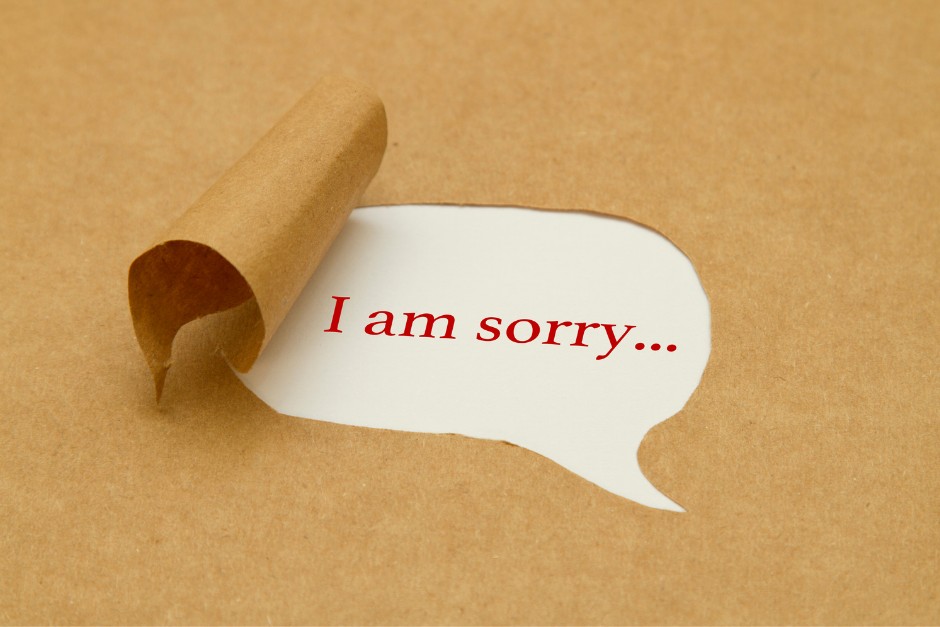The famous catchphrase “Love means never having to say you’re sorry” from the popular 1970s novel and movie Love Story, sends a flawed message.
Off the movie screen, in daily life, the process of apologizing and forgiving is essential to conflict resolution and maintaining a healthy relationship. We’re all imperfect, and we inevitably hurt the ones we love. Effectively and sincerely apologizing allows us to repair an issue, forgive and move forward.
How you apologize, however, can have a lot to do with your attachment style. Recent research shows that adults who grew up in a securely attached, loving home are more likely to effectively communicate their apology than those with anxious, avoidant or disorganized attachment styles.
The Effective Apology
To understand why, let’s consider the basic components of a good apology:
1. A clear “I’m sorry” statement.
2. An expression of regret for what happened.
3. Accepting responsibility.
4. Providing an explanation without deflecting responsibility.
5. An empathy statement acknowledging the full impact of the words or actions on the other person.
6. Making an effort to repair the damage.
7. A promise to do better in the future.
8. A request for forgiveness.
Certainly, a heart-felt and meaningful apology is not just a quick “I’m sorry,” it should include some or all of these components.
The Attachment Perspective
People with secure attachment tend to be trusting, empathic, tolerant of differences and forgiving. They can communicate their emotions and needs honestly and openly and are attuned and responsive to their partner’s needs. They are confident in their relationship and therefore aren’t afraid of conflict. They can manage their emotions and have enough insight and experience with resolving conflict that they can move past issues.
These qualities allow the securely attached adult to understand the other person’s perspective, empathize with it and not be afraid to take responsibility for their wrongdoing.
Research published by Karina Schumann and Edward Orehek in 2017, describes two separate experiments looking at attachment styles and apologies.
In the first, individuals were asked to imagine making an apology and in the second, they were asked to write an apology letter for someone they had hurt in the past. Predictably, the research showed that securely attached individuals tended to communicate a comprehensive apology including most elements of the effective apology.
On the other hand, the researchers found people with avoidant or anxious attachment styles tended to include fewer elements of a good apology or were less consistent in how they apologized.
As we have discussed in previous articles on adult attachment, the dismissive or avoidant adult is emotionally distant, cool, controlled and stoic. They are emotionally unavailable to their partner and find it difficult to talk about their feelings or be vulnerable
A good apology, however, requires a level of emotional investment that people with an avoidant attachment style find challenging. The individual must be willing to be emotionally vulnerable as they are trying to make amends and seek forgiveness. They must be empathetic and able to prioritize the needs of the other person.
According to Schumann and Orehek, avoidant individuals were less likely to offer a comprehensive apology. Instead, they were defensive, prone to justify their behavior, blame the other person and make excuses.
The authors’ results for the anxiously attached individuals were less consistent. This, they suggest, may have to do with the traits of the anxiously attached individual and their motivations. The anxiously attached adult is insecure in their relationship. They fear rejection and abandonment and become highly distressed when there are negative feelings. Therefore, the anxiously attached individual may very well be driven to communicate a comprehensive apology. But it may not be because they understand and feel empathy for the other person’s pain, but because they feel compelled to return to their partner’s good graces.
Another trait of the anxiously attached individual is that they don’t communicate collaboratively and find it challenging to see their responsibility in relationship issues. So rather than apologize, they become highly emotional, focus on their own grievances without empathy for the other person, turning their apology into even more conflict.
Apologizing, in a comprehensive, heartfelt way when we hurt a loved one builds connection and trust and is essential to maintaining a healthy relationship. It is just one of the key skills we focus on in Attachment Communication Training at Evergreen Psychotherapy Center, to find out more about our philosophy and methods, visit evergreenpsychotherapycenter.com.



Great article. Self forgiveness is something that I have done.
Thank you for your comment. Sometimes forgiving yourself is the hardest step to take toward healing.